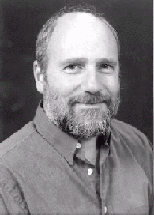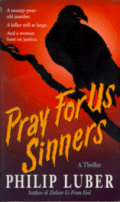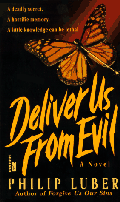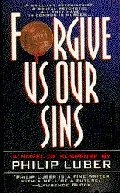Interview With Philip Luber
by Claire E. White
Philip Luber is a forensic psychologist with degrees from Tufts University, Temple University, and the University of Texas. He has spent the past eighteen years evaluating and treating violent mentally ill patients and criminal offenders. Dr. Luber's first novel, Deadly Convictions (Warner Books, 1986), is the story of a sinister mass-murderer who fools the legal system into finding him not guilty by reason of insanity. Forgive Us Our Sins (Fawcett Books,

|
Where did you grow up?
I was born and raised in Philadelphia. I lived in a safe city neighborhood. You could walk at night without worry. About fifty rowhouses backed up onto a common alley, so as a young boy I had plenty of company without needing to cross any streets. Stickball and touch football in the alley, ice cream trucks in the summertime, and when I was a little older there were buses and elevated trains to take me downtown. It was safe, but there was drama. Alliances made and unmade. Romantic rivalries. Bullies. The FBI caught up with a Soviet spy who was living a few blocks away from my house. An elderly, mildly demented neighbor used to take our garbage pail and hide it in her bedroom. My best friend, who fancied himself an amateur chemist, accidentally set off an explosion in his driveway that knocked me off my feet and ignited his face and hair. With the exception of a few years in Texas, I've spent about half my life in Philadelphia and half in the Boston area. My first published novel, Deadly Convictions (Warner Books, 1986) was set almost entirely in Philadelphia, and I made extensive use of my childhood neighborhood. My three other books are all set in Concord, Massachusetts, which is where I have lived since 1981.
When you were growing up did you know you would be both a psychologist and a writer?

|
Tell us what a forensic psychologist actually does. What's it like to interview killers for a living?
A forensic psychologist practices at the interface of psychology and the law. In his old song, "Alice's Restaurant," Arlo Guthrie wrote about finding himself seated one day with a group of "mother-rapers, father-stabbers, and father-rapers." Those are the people I spend my professional time with. I've spent eighteen years working with criminal offenders and violent mentally ill patients. Some have committed indescribably brutal acts. For every wretched fantasy you have, I know someone who has lived it. The work is challenging, frightening, depressing, exciting -- all of the above and more.
How do you keep the horrific things that you hear during the day in your practice out of the rest of your life?
Well, there's always the possibility of escape through the unbridled use of controlled substances, or through random coupling with multiple and temporary partners. But I'm a husband and a father, so my options along those lines are limited. So it helps to develop a gallows sense of humor -- to look, in an almost macabre way, on the light side of things. I recall a psychotic man who had just been arrested. He was very energized, almost euphoric, as he grinned and said, "I killed my mother *and* I killed my father! And *another* good thing -- I quit smoking!" And I remember a young hoodlum who was awaiting trial for the robbery, rape, and murder of a nurse. The evidence against him was absolutely incontrovertible, but he maintained his innocence. "Everybody keeps saying I'm a murderer," he complained. "Man, that ain't me. I ain't no murderer. The next person who calls me a murderer, I'll kill the m_____-f_____!" But real-life murder is a terrible and ugly thing, and so I try to take it very seriously in my books. I've spent too much time in the company of killers to take it any other way. I don't gloss over the violence in my books. I want my readers to be disturbed by it.
You've been quoted as saying that violence almost always makes sense in novels, but sex seldom does. What did you mean when you said that?
Fortunately, few of us encounter serious violence on a regular basis. Thus when it does occur -- in real life, or in a book -- the very act of it happening stands out as something unusual or noteworthy. That means a violent scene will, if nothing else, almost always serve to move the plot forward in some significant way. But almost all of us have had sex, and some people have it with a relative degree of frequency. We all have the same body parts, and we all do pretty much the same things with them. It's unlikely that a sex scene will do much to move a plot in a new direction. Most sex scenes I've read slow the plot down and serve only to titillate. On the other hand, I've always liked that word. Titillate.
And yet you have a torrid and very graphic sex scene in Pray For Us Sinners.
I look at it as being a love scene, not a sex scene. The characters are at a critical juncture in their relationship, and the particular way they make love in that scene highlights the relationship issue for the reader. And, I'm pleased to say, it does titillate.
What prompted you to write your first novel?
I was involved in a what-if conversation with some colleagues at a hospital for violent mentally ill patients. We were talking about how we would feel if we made a terrible mistake -- if someone we decided to discharge did something horribly violent after his release. I began to think about an entirely different sort of mistake, and those thoughts turned into the idea for Deadly Convictions.
How did the sale of your first novel come about?
Nothing out of the ordinary. I wrote an outline and partial manuscript, I found an agent who liked what I wrote, and she sold it.
When do you find time to write, given the fact that you have a full-time psychology practice?
Early in the morning. Late at night. I don't sleep a lot.
How have your interviews with real criminals aided you in creating characters for your novels?
It takes a certain imprudence to ask people about the intimate workings of their twisted minds. And it takes a certain imprudence to write a novel-length manuscript with the assumption that others will actually want to take the time to read it. There's probably some sort of relationship between those two things, but I'm not sure what it is.
Why did you decide to use Concord, Massachusetts as the setting for your books?
I live in Concord, and I think it's a lovely place. It's a quiet and privileged town where bad things aren't supposed to happen. But in my books those bad things do happen. I like that contrast -- the serenity of the home town of Emerson and Thoreau, balanced against undercurrents of evil and madness.
How did you create Dr. Harry Kline? Is there any of you in the character?

|
Why did you decide to do that?
Harry is a widower. In the first book in the series, Forgive Us Our Sins, I needed a short scene where one of Harry's Concord neighbors comforts Harry's daughter. I've seen my wife do that many times with our own daughter, and I've always been awed by it. So putting my family into that scene just seemed to fit intuitively. My daughter got such a kick out of seeing her name in the book that I've continued to do that in Deliver Us From Evil and Pray For Us Sinners.
What was your inspiration for Veronica Pace?

|
Let's talk about your latest book starring Dr. Harry Kline and FBI agent Veronica Pace. Pray For Us Sinners is a thriller, but unlike many thrillers, the plot about the relationships between the main characters seems as important as the action. Was that element of the story important to you?
Definitely. As I write each book, I always keep two distinct end points in mind. First, I always know the solution to the central mystery when I begin a book, and I try to direct all the action and events of the book toward that end. Second, I keep in mind where I want Harry and Veronica to be in their relationship with one another at the end of the book, and I try to direct everything toward that end as well. Writing a series allows me the chance to create characters and relationships that mature over time. Although many good series revolve around characters who remain essentially the same from book to book, as a reader I have always been drawn to series in which the people age, change, and grow. And that's what I've tried to do in my series. The relationship between Harry and Veronica becomes more emotionally intimate over the course of the series, and I think my readers like that a lot.
Both Harry and Victoria must face great grief in their lives. Was it difficult to incorporate these issues into the action without overwhelming the story line?
Harry's wife died seven years before the opening action of Pray For Us Sinners. He continues to deal with the effects of that loss, and with the problems of being a single parent to his daughter, who was only four years old when Harry's wife died.
| "There's a well-established body of research that indicates that the most severe mental illnesses -- 'mad' behavior, if you will -- have substantial biological roots. It's not at all clear that criminal behavior -- 'bad' behavior -- can be explained that way." |
What feelings would you like readers to take away from Pray For Us Sinners?
Pray For Us Sinners is, of course, a thriller. But it's also a love story. The caring between the main characters is a crucial element of the book. And it's a story about people struggling with larger, eternal questions. What are the natures of faith, love, and justice? How can people maintain a belief in a God who allows terrible things to happen to good people? I doubt that I will ever write a sentence that carries a more satisfying emotional wallop than the final sentence of this book. It's my hope that when readers reach the end, they will experience an enormous amount of affection for Harry and Veronica, and great happiness at the solutions my characters have worked out for themselves.
What's next for Harry and Victoria - can you give us a sneak peek?
The fourth book in the series will be released next year. It involves serial murder, Walden Pond, racial prejudice, and prostate cancer -- four things that have never before in the history of civilization been grouped together in one sentence.
In the past few years rather graphic novels about serial killers (such as those by Cornwell and Patterson) have continued to rise in popularity. In your opinion, why are so many human beings so fascinated by the gruesome details of another human being's death? Is that "normal"?
Why do we do it? Hell, I don't know. I suppose my choice of career is a disguised reflection of that sort of prurient interest. Is it normal? I suppose so, if you define "normal" to mean what many or most of us do. When is the last time you drove past a traffic accident without slowing down to look at the carnage? It reminds me of a passage from an old song called "Crucifixion," by Phil Ochs. He sings about JFK's assassination. "How did it happen? I hope his suffering was small. Tell me every detail, I've got to know it all. And have you got a picture of the pain?"
Does the current fascination with true crime and gore indicate a problem in our society?
I'm not smart enough to comment knowledgeably on that point. I have enough trouble matching my socks, remembering my friends' birthdays, and eating without drooling. I hate listening to others pontificate, so I try to avoid pontificating.
Do the majority of violent criminals that you treat have an organic cause for their sociopathic behavior, or do you believe that their environment led to their lives of crime?
There's a well-established body of research that indicates that the most severe mental illnesses -- "mad" behavior, if you will -- have substantial biological roots. It's not at all clear that criminal behavior -- "bad" behavior -- can be explained that way.
When you are not working, what are your favorite ways to relax?
I write music. As one friend is fond of reminding me, I'm a singer-songwriter unknown by countless millions.
What kinds of books do you like to read; who are some of your favorite authors?
| "We're all more alike than we are different. Depending on your point of view, that thought can either bum you out or give you hope." |
Do you receive much feedback from your readers from having a website? What have their reactions been to the series?
People appreciate my having posted sample chapters on the Web. Several readers have taken advantage of the order sheet for autographed copies. And I enjoy getting comments and questions at the e-mail address I've posted on my Web page.
You have an interesting quote on your website. You state that, "For every unsavory impulse you keep under wraps, I know someone who has acted it out. I have known the evil and the ill, and have found them to be different from the rest of us more in degree than in kind." Would you elaborate on that statement?
It's always tempting to make ourselves feel better by putting other people down. That's what prejudice and scapegoating are all about, not to mention a high percentage of our political campaigns. But I've always liked something a well-known psychiatrist, Harry Stack Sullivan, wrote. In fact, I used the line in Deliver Us From Evil. "We are all more simply human than otherwise." Under the right circumstances, each one of us is capable of doing awful things, and also capable of doing great good. That's hardly an original thought, but it's something I definitely believe. The patients and inmates I meet in my work have those same capacities for good and evil that you and I have. We're all more alike than we are different. Depending on your point of view, that thought can either bum you out or give you hope.
Return to the March 1998 issue of The IWJ.
More from Writers Write
